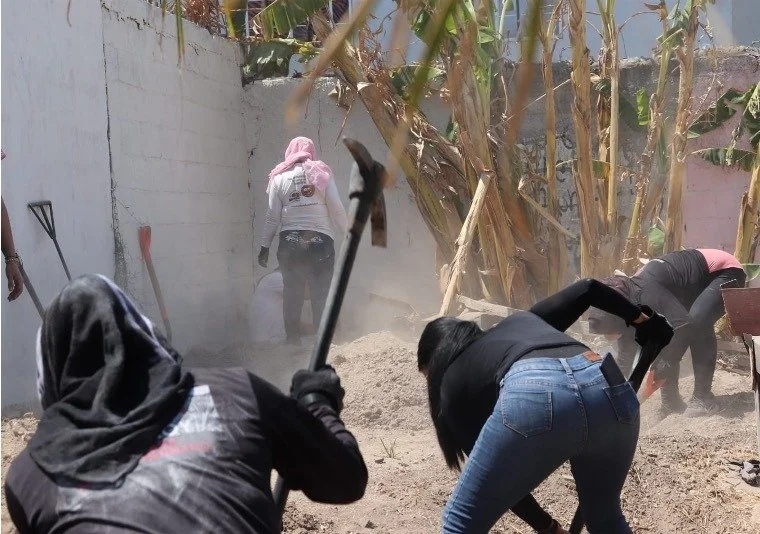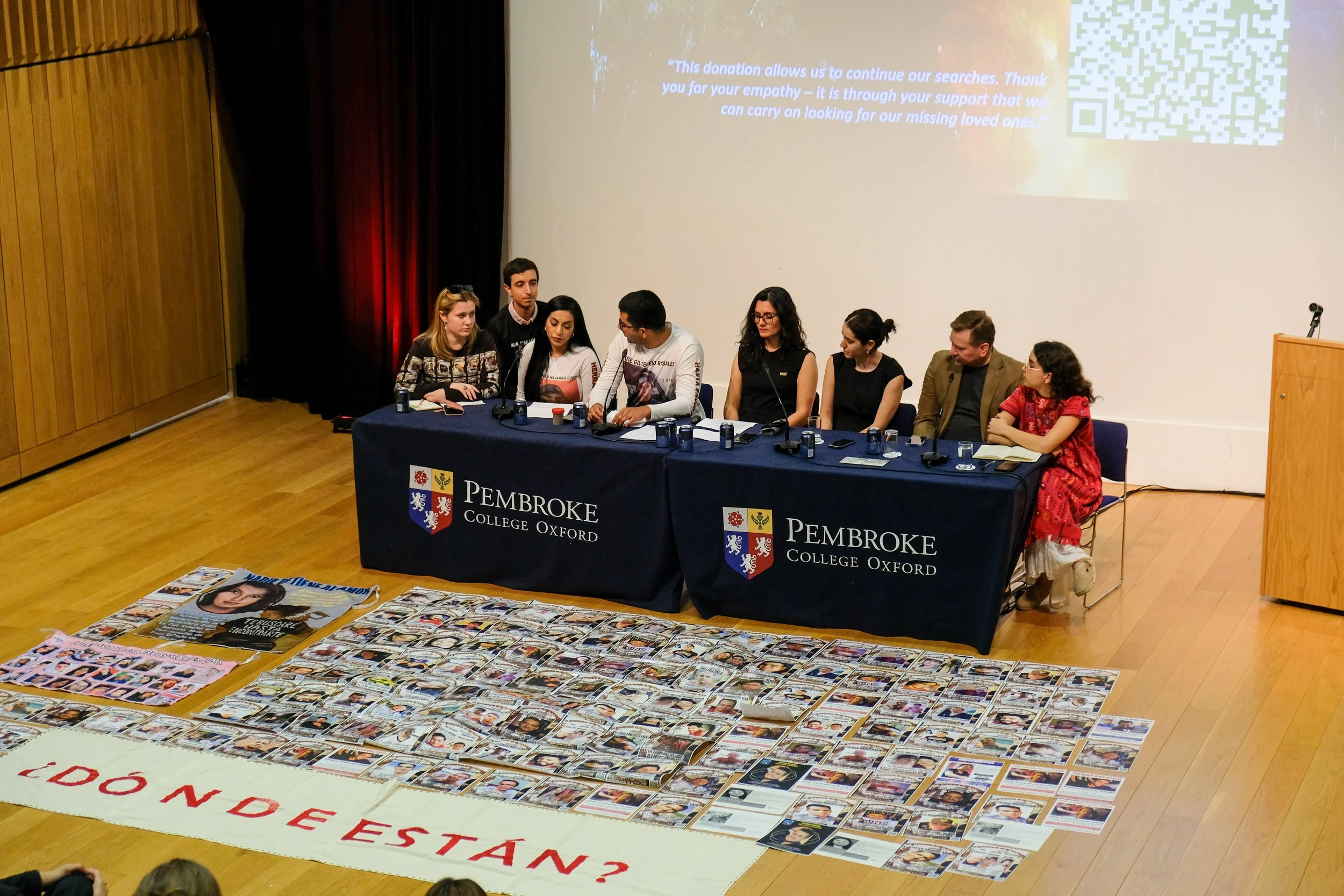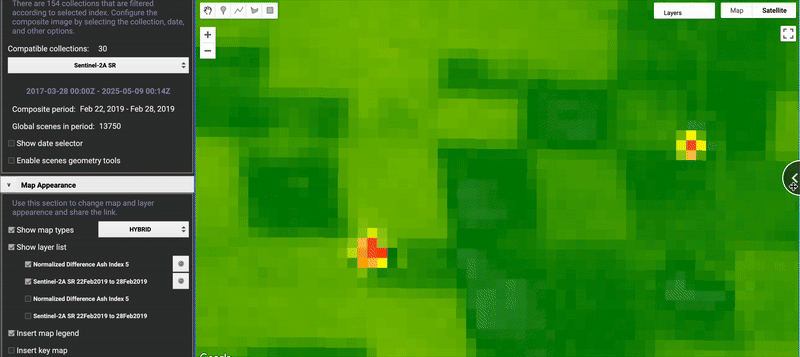Technological responses to disappearance in Mexico
A blog by Mariela Garfias, a Frontier Tech Pioneer
Pilot: FOUND - testing technologies to locate clandestine graves
Mothers and sisters search for evidence. Image credit: Guerreros Buscadores de Jalisco
In 2015, Indira Navarro’s brother Jesús Hernán Navarro disappeared. A 28-year-old psychologist and father, he is one of thousands missing across Mexico.
Indira has spent the last decade searching for him, alongside hundreds of mothers and sisters who form the Guerreros Buscadores de Jalisco, the Warrior Seekers. They risk being threatened, intimidated and chased out by organised crime groups on a frequent basis. Her companion Maria was murdered along with her son just weeks ago. Despite the danger, their collective search for truth, peace and closure is a humbling, unstoppable force, driven by extreme love and loss.
They know the terrain intimately: spotting natural anomalies, smelling decomposition, or noticing the yellow flowers that bloom over disturbed ground.
I was honoured to participate in a panel with Indira at Pembroke College, Oxford, recently, alongside technologists and forensic archaeologists to discuss Technological Responses to Disappearance.
Panel event in Pembroke college: ‘Dónde están?’ means ‘Where are they?’ Indira is 3rd from the left, Mariela 3rd from the right. Image credit: Shiwen Li
Indira’s commitment was unshakable as she shared the risks and realities of searching in Mexico. She spoke of bodies, clandestine crematoriums and forced recruitment, and graves found in the desert, in houses, schools and even, once, a playground.
The use of technology to dignify, restore and remember
Searchers (buscadoras), like Indira, need all the help they can get. Multiple technologies typically used in agriculture can bring them one step closer to peace and closure in a world that, as Indira shared, “surpasses th𝘦 𝘸𝘰𝘳𝘴𝘵 𝘩𝘰𝘳𝘳𝘰𝘳 𝘧𝘪𝘭𝘮 𝘺𝘰𝘶 𝘤𝘰𝘶𝘭𝘥 𝘪𝘮𝘢𝘨𝘪𝘯𝘦.”
We want to combine the grassroots knowledge of buscadoras with cutting-edge technological tools, like electrical resistivity (a kind of tomography which detects soil disturbances), seismic instruments, drones and spatial data analysis.
In 2023, I worked with Miguel Moctezuma, Coordinator of the Global Security Programme at the University of Oxford, and Dr José Luis Silván of CentroGeo, to apply for funding through the Frontier Tech Hub, a programme run by Research and Evidence Directorate. We were delighted to be selected and launched our pilot project, FOUND, where we collaborated with Guerreros Buscadores de Jalisco testing technologies to establish the conditions and combinations which prove most successful. The results are very promising.
The story of Izaguirre Ranch
During the panel, Dr José Luis shared how multispectral satellite imagery successfully located ash deposits, long after fires had burned. The discovery made headlines across the world earlier this year, and the words Izaguirre Ranch are now infamous.
“We were able to detect, within 20 meters of precision, where the cremations happened. The ashes are still there.”
When they travelled to the ranch, one mother spotted her son’s jacket among the scattered belongings and said: “‘This is what I wanted. I wanted to know. Now I know. Let’s find more,” before picking the shovel up once more.
That continuous determination deserves to be reflected in a tech stack that continually improves, and the learnings from that discovery now informs the search for more. New data = new variables = better predictive models.
Satellite imagery in use. Credit: CentroGeo
Partnerships, growing impact and new tech on the way
As a result of our work, we have located 27 disappeared persons, bringing answers and a measure of closure to 27 searching families.
But this is only the beginning. The Jalisco Search Commission now incorporates our methodologies and some of these technologies in their official search operations, with further acquisitions scheduled for 2026. Prosecutors across Mexico are increasingly requesting our support, and we are seeing the growth of technology as a means to make an impact.
FOUND has only been possible through deep partnerships with institutions, universities and forensic teams across the UK, US, Uruguay and Colombia. Being a Frontier Tech pilot has given us the space, flexibility and support to experiment. On an issue where action is slow, I am proud that the FCDO is funding a potential gateway to peace for hundreds of thousands of family members.
Disappearance is not unique to Mexico. FOUND is ready to scale across Mexico and other conflict-affected countries, and we’re looking for collaborators. If you’re interested, please contact mariela.garfias@fcdo.gov.uk.
The panel take questions from the audience. In front sit the photos of hundreds of missing sons and brothers. Credit: Shiwen Li
If you’d like to dig in further…
🚀 Explore this pilot’s profile page




